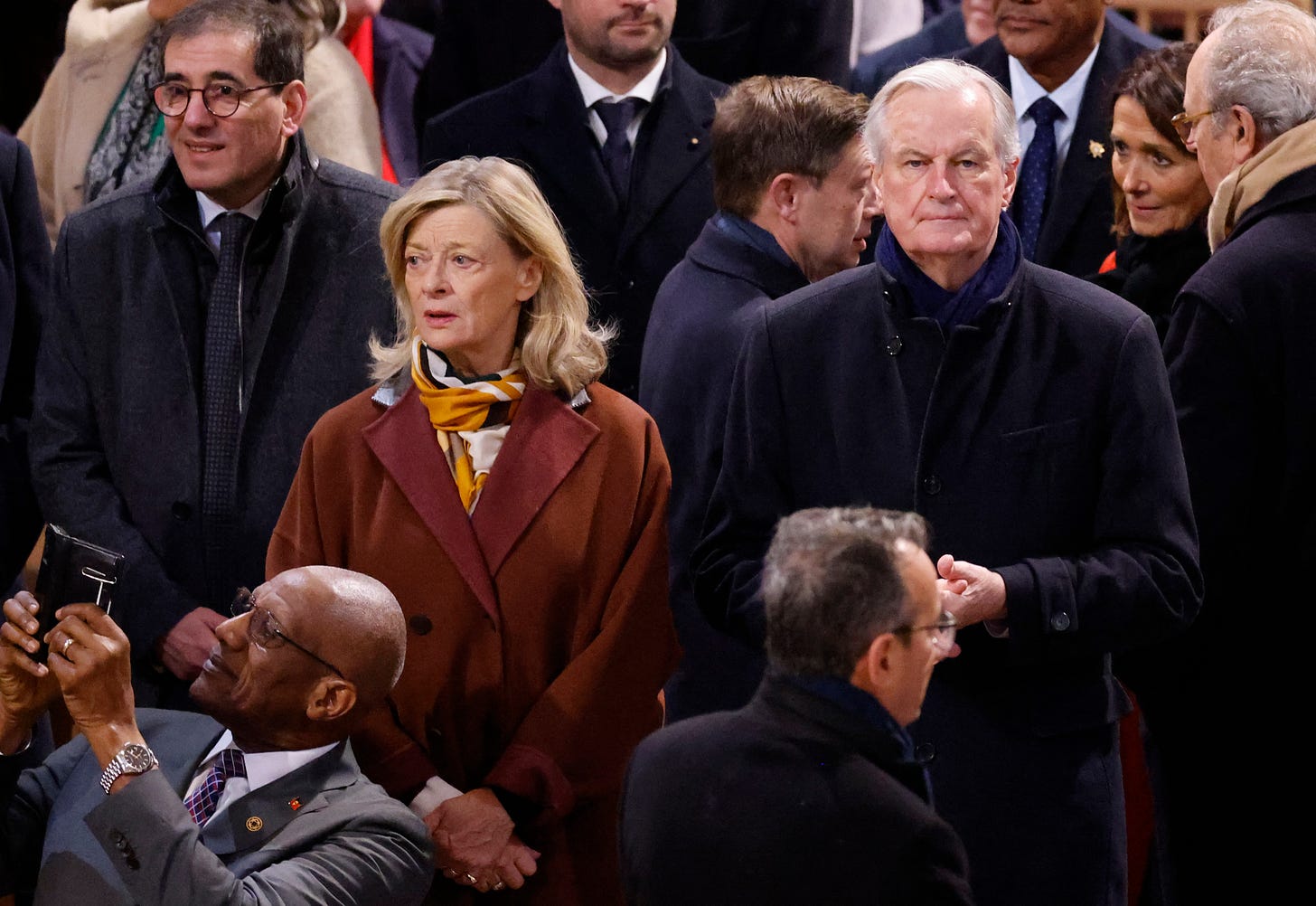France Goes For Broke
The winner-takes-all political system has all sides sharpening their knives.

France’s 1958 constitution was designed to deliver stable, effective government. The country had had enough of transient prime ministers serving at the whim of party barons who were more concerned with parliamentary games than with the national interest.
The new system, known as the Fifth Republic, created a powerful executive dominated by a towering president. Parliament was cut down to size: its job was no longer to make and unmake cabinets but to provide the government with a dependable majority.
Just how far France has strayed from that model was made clear by the fall of Prime Minister Michel Barnier in a vote of no-confidence on Wednesday. No government had suffered such ignominy since 1962. Barnier, a center-right former EU envoy, had been chosen by President Emmanuel Macron to lead a minority government after an inconclusive snap election in July. With his negotiating skills, it was hoped he would find a way to steer legislation through a deadlocked assembly. Some hope!
The weeks of wrangling that led to his nomination highlighted the nuisance power of party chiefs, prompting analogies with the Fourth Republic. After three months of impotence, the prime minister was put out of his misery on Wednesday when his key enemies, Marine Le Pen on the far right and Jean-Luc Mélenchon on the radical left, joined forces to vote him out after Barnier failed in his bid to curb out-of-control spending. Both are now after Macron’s head.
The comparisons with the Fourth Republic, it turns out, were unfair to the latter. Back then, despite recurring cabinet crises, the country chugged along and growth was good. Today it is in dire financial straits. The last time the government balanced its books was 50 years ago and public debt is 111% of GDP. Only Greece and Italy are doing worse within the EU—and both are stepping back from the brink. France is moving in the opposite direction: the budget deficit topped 6% of GDP this year and borrowing costs are already higher than Greece’s.
Without a cabinet and without a budget, the country could be facing not just a debt crisis but institutional meltdown. A parliamentary election cannot be called until June. After Barnier’s eviction, it’s hard to see how a viable government can be formed.
What went wrong? How did chaos emerge from a system built to ensure stability?
Poor decision-making at the top played a large part. The turmoil can be traced to Macron’s re-election in 2022. It was quite a feat, as French voters are serial abusers of incumbents. The victory, however, was bittersweet: in the ensuing parliamentary poll the president’s centrist bloc lost its absolute majority. It was able to govern by begging for centre-right votes, as Mélenchon’s hard-left troops used every obstructionist tactic in the book. When all else failed, Macron’s prime ministers resorted to invoking an article in the constitution that allows enactment without a vote.
But the haggling and the threats did not suit the Superman style that had characterised the president’s first term. Frustrated at every turn, he ran out of patience in June 2024. On the evening of the European Parliament election, in which his supporters took a drubbing, Macron called a snap parliamentary election in a bid to “clarify” the political situation. There was no need to do so: elections for Euro-MPs involve no domestic stakes and voters often use them to vent. But Macron took the defeat personally and dared the electorate to choose between him and opponents he described as demagogues who would lead the country to ruin.
It was a reckless move on the part of a leader who had just suffered defeat at the ballot box. Macron was prepared to risk what would have been, by his own admission, a catastrophic victory for the insurgent far-right. In the end, tactical voting deprived Marine Le Pen’s National Rally (RN) of a majority. Instead, the election produced a stalemate and a slow-burn implosion: the assembly was divided into three roughly equal blocs, with none willing to work constructively with the two others. Any prime minister would have been on an ejector seat.
But Macron is not the only figure to have acted irresponsibly in this saga. On the left, Jean-Luc Mélenchon was not merely prepared to risk chaos: he invited it. In July, he argued that the New Popular Front (NFP), a coalition of left-wing forces he assembled for the election, should form a government, as it was now the largest bloc in the assembly. He had a point. But Mélenchon’s insistence on enacting the “whole programme, nothing but the programme” of the NFP was a non-starter. This tax-and-spend extravaganza would have united all other parties against it and he knew it. He never showed any interest in compromise. His avowed strategy has been to oppose any government he did not control, and bring down Macron. The president, who is half-way through his second five-year term, does not have to resign. But Mélenchon is banking on financial panic and social unrest to force his hand.
On the right, Marine Le Pen has shown a similar appetite for destruction. In recent years, it is true, she has strived to make the RN respectable. She put on a brave face after her relative setback at the snap election. Unlike Mélenchon, she played the institutional game as a firm but reasonable opposition force. After Barnier’s appointment she gave him a chance by ruling out an immediate vote of no-confidence.
But her tone changed last month after she was accused of embezzling EU funds. Le Pen might now be particularly keen on a snap presidential election. She is due to be sentenced on 31 March and could be ruled ineligible as a result: unlike Mélenchon, she stands a good chance of winning the presidency some day, and now might be her last opportunity for many years.
Her opposition became uncompromising. During Barnier’s final attempt this week to get the social security bill passed, she rejected the prime minister’s offer to reverse most of the budget cuts she had opposed. Again, it was all or nothing. She has now joined the left-wing push for regime change, come what may.
Finally, the centrist and conservative heavyweights didn’t show much sense of statesmanship, either. Although seen as Barnier’s natural supporters, all stayed well away from his cabinet, and some took potshots at him. With their eye fixed on the 2027 presidential election, they did not want to own the thankless work of keeping the country running in such difficult times.
Why, then, was not a single party leader willing to put the national interest ahead of their own? Some say that France lacks the culture of compromise that prevails in other European countries. But this is not true: the Fourth Republic—as well as its predecessor going back to the 1870s—was based on deals between parties. Neither can the problem be down to individual character. There is no reason to believe that French politicians are any more self-serving than those of other countries.
The fact that so many felt that failure was worth the risk raises the question of the incentives created by the Fifth Republic. It is in effect an elective autocracy: all key decisions are meant to rest with a single leader, sanctified by the popular will; all meaningful checks have been removed. In such a winner-takes-all system going for broke is a good strategy for those hoping to pick up the pieces.
Henri Astier is a London-based journalist who writes for French- and English-language publications.
Follow Persuasion on Twitter, LinkedIn, and YouTube to keep up with our latest articles, podcasts, and events, as well as updates from excellent writers across our network.
And, to receive pieces like this in your inbox and support our work, subscribe below:




I think it is a more simple explanation. The western elite gilded class has pursued an economic trajectory that enriched themselves at the expense of the lower income classes, and the unrest this has caused has resulted in political instability. That instability has been exacerbated by moves by the elites to crush the opposition to their globalist corporatist looting.
France is unique it its history, culture and political design, and thus its situation appears unique with it conflicts. However, the basis is ubiquitous will all western political conflicts today... and the root cause of it can be explained simply by China's economic rise. The west significantly screwed up allowing the elites to fatten their investment accounts at the expense of the economic parity and health for the bottom 80%. Now those justifiably upset lower income chickens are coming home to roost.
We are seeing a political unraveling of western democracy that is directly related to the previous decades of upper class greed behind the globalism scam. The Global Order is ending and it is stirring up a reshuffling of tribal conflict to secure advantage.
This is a solid and balanced summation of the current state of French politics. I would be interested in what the author thinks of the criminalization of politics and whether it is counterproductive.